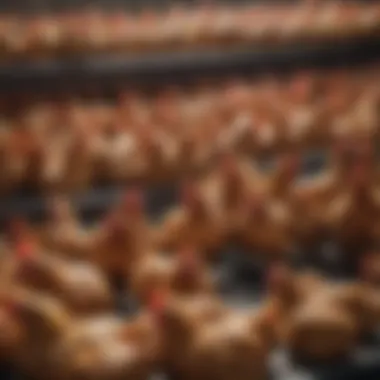Understanding Why Chickens Eat Their Own Eggs


Intro
Egg eating in chickens isn’t just an odd behavior; it can be quite a puzzle for those caring for these birds. Many poultry owners find themselves scratching their heads when they notice their hens munching on their own eggs. Understanding the why behind this behavior can help mitigate the problem and ensure the health of the flocks.
Topic Overview
Definition of Key Terms
Before we delve deeper, it's essential to outline some key terms:
- Egg Eating: The act of hens consuming their own laid eggs.
- Nutritional Deficiencies: Lack of essential nutrients which can drive chickens to seek out alternative food sources like their eggs.
- Behavioral Patterns: Ingrained actions or reactions that could lead to egg eating, often influenced by external factors.
Relevance in Agriculture, Horticulture, and Agronomy
Understanding egg eating is crucial for poultry farmers. If hens are resorting to this, it often hints at larger underlying issues. Addressing such behavior not only sustains egg production but also reflects a farm's overall management practices.
In the world of agriculture, maintaining the health and productivity of livestock directly influences economic stability. Egg-eating hens can lead to significant financial losses and farmer frustrations, making this an important concern for those involved in agriculture or poultry farming.
Current Trends and Innovations
Recent Advancements in the Field
There’s been a recent surge in research focused on animal behavior in agricultural settings. Studies emphasize understanding environmental impacts, such as coop design or flock dynamics, illuminating reasons behind egg-eating trends. Newer publications advocate for a holistic approach that balances nutrition and environmental conditions.
Emerging Technologies and Practices
With technology evolving, modern poultry farms are beginning to adopt sensors to monitor chicken behavior and automate feeding processes. Integrating smart feed systems can help ensure that chickens receive balanced nutrients, minimizing the temptation to eat their eggs.
Practical Applications
Step-by-Step Guides or How-Tos
Maintaining a healthy environment for your chickens is key. Here’s a basic approach to counteract egg eating:
- Assess Nutrition: Ensure your chickens are getting enough calcium, protein, and other essential nutrients.
- Monitor Environment: Observe coop comfort. Is it too cramped? Too hot or too cold?
- Reduce Stressors: Keep disturbances to a minimum, especially during laying times.
Tips and Best Practices for Implementation
- Add Variety: Balance their diet. Treats like kitchen scraps or special grains can prevent boredom.
- Inspect Eggs Regularly: Collect eggs frequently to minimize chances of them going unnoticed.
- Provide Enrichment: Toys or dust baths can keep them occupied and less likely to turn to egg eating.
“A well-balanced chicken is a happy chicken.” – This underscores how addressing nutritional and environmental factors can lead to healthier behavior in chickens.
Preamble to Egg Eating in Chickens
Understanding the behavior of chickens, especially concerning egg eating, is crucial for poultry keepers. This phenomenon can lead to significant challenges in maintaining a healthy flock and ensuring a consistent production of eggs. A deep dive into the intricacies of this behavior provides invaluable insights into its underlying causes and prevention strategies.


Overview of Poultry Behavior
Chickens are social animals with complex behaviors and needs. Their natural instincts govern many aspects of their daily lives. Like all domesticated species, chickens exhibit behaviors shaped by environmental conditions and social interactions within the flock. For instance, pecking is a form of communication among them, expressing everything from hierarchy to exploration. However, when these behaviors shift towards destructive actions such as egg eating, it raises alarms about their well-being.
Delving into poultry behavior begins with understanding their feeding habits. Chickens typically peck at various items based on curiosity or hunger. Unfortunately, if they discover eggs, this might lead to an unwanted habit of egg eating. This misguided behavior can stem from many factors, ranging from boredom to inadequate nutrition, making it critical for farmers to recognize patterns early.
Significance of the Egg Eating Phenomenon
The significance of egg eating can't be overstated. Firstly, it presents direct implications for egg production. If chickens are consistently eating the eggs laid, the overall yield takes a hit. This situation isn't just detrimental for farmers looking to operate profitably, it's also disheartening for those caring for their flock.
Beyond the economic consequences, egg eating can be symptomatic of broader health issues within the flock. For example, nutritional deficiencies can lead chickens to seek alternate sources of sustenance, including their eggs, which can send a signal that their dietary requirements aren't being met. Additionally, stressors in the environment, like overcrowding or inadequate resources, can exacerbate the behavior.
Effective management of this egg eating behavior involves a mix of vigilance and proactive strategies to maintain the health of not just the chickens but the entire farming ecosystem.
Identifying Egg Eating Behavior
Recognizing the early signs of egg eating in chickens is crucial for flock management. When hens start pecking and consuming their eggs, it can lead to several challenges. Not only does it drastically reduce egg production, but it may also result in stress and health issues among the birds. Being able to identify these behaviors early can help mitigate potential losses and foster a healthier environment for both the chickens and their keepers.
The process of Identifying Egg Eating Behavior involves observing specific symptoms and understanding the differences between pecking and actual eating of eggs. These are essential facets in preventing the spread of this unwanted habit. Chicken owners must pay close attention to the behavior of their birds. Any deviation from the norm could signal a larger issue, necessitating immediate action.
Symptoms and Indicators
To effectively deal with egg eating, knowing the symptoms can make a world of difference. Here are some common indicators that your chickens might be engaging in this behavior:
- Shell Fragments: If there are broken eggshells found in the nesting area, it can point to hens pecking at their eggs. Scrambled shells indicate aggression as birds tire of conventional pecking.
- Behavior Changes: A sudden change in demeanor can signal trouble. This includes hens being more aggressive or displaying excessive interest in the nesting boxes.
- Missing Eggs: Regularly checking for intact eggs can help track whether your birds are munching on their treasures. When a hen consistently lays fewer eggs, it’s time to investigate the potential reasons.
Keeping a close eye on the nesting boxes and maintaining a watch on the flock's behavior can save precious resources. Owners may even consider documenting egg production trends in a journal.
Distinguishing Between Pecking and Eating
While pecking at eggs is common behavior, it is not equivalent to eating them. Understanding this distinction is paramount. Not all pecking is harmful; sometimes chickens explore their surroundings, which might involve tapping on their eggs with their beaks. However, the line blurs when they begin to consume the contents. Here’s how to tell the difference:
- Aggressive Behavior: If a hen is breaking the egg or consuming it within moments, this should raise alarm bells. Pecking, on the other hand, tends to be less forceful and often aimed at curiosity rather than consumption.
- Timing: Observing the timing can provide clarity. If a bird is engaging with eggs consistently during feeding times, it could indicate a pattern of proactively eating them rather than a sporadic pecking out of curiosity.
- Feather Loss or Crop Issues: In some instances, poultry that eats eggs may display signs of feather loss or digestive issues. These problems sometimes stem from dietary deficiencies or stress, which may augment pecking behavior.
By closely monitoring these signs, chicken keepers can take relevant actions to prevent further escalation of the problem. A combination of vigilance and understanding of chicken behavior is key in managing and mitigating egg eating, which ultimately leads to a healthier flock.
Causes of Egg Eating
Understanding the causes behind chickens eating their own eggs is vital for poultry management. When flock owners comprehend these causes, they can take actionable steps to mitigate the issue. Egg eating not only lowers production but can also signal underlying health or management problems. Addressing the root causes helps ensure a healthier flock and enhances overall egg production.
Nutritional Deficiencies
Importance of Calcium
Calcium is more than just a mineral; it's a cornerstone of health for laying hens. When chickens lack sufficient calcium, their bodies scramble to pull from other resources, potentially leading to weak shells. A key characteristic of calcium is its role in forming eggshells, which literally holds everything together. If hens find their eggs messy and cracked due to thin shells, they may become consumers of their own products out of instinct. This makes understanding calcium needs crucial in maintaining a healthy flock. Its unique feature lies in its ability to be sourced from various foods, like leafy greens or fortified feeds, which offer a versatile way to meet these dietary requirements. However, the downside here is if the wrong balance of calcium is introduced, it can lead to other health problems.
Protein Needs


Protein is another critical nutrient for chickens. It serves as a building block for growth and egg formation. Without enough protein, laying hens might turn towards their own eggs in a desperate attempt to fulfill their body’s demands. The key characteristic of protein is its necessity for creating the tissues and enzymes that facilitate egg production. Inadequate protein intake may not just affect egg production but can lead to egg eating as hens instinctively seek out higher protein sources. This behavior demonstrates a unique feature wherein a nutritional deficit may kick off unexpected behaviors. One possible disadvantage is that high-protein diets, if not managed properly, can also lead to excessive weight gain and other health issues.
Environmental Factors
Space Constraints
Space is a fundamental component of chicken well-being. When flocks are cramped together, stress levels can skyrocket. Hens that are packed like sardines in their coop often lack the space to roam, invariably leading to frustration and aggressive behaviors. Thus, the key characteristic of space is its direct correlation to comfort and freedom in movement. A well-sized environment fosters better social dynamics among hens. Larger areas enable natural behaviors like foraging and nesting, reducing the likelihood of them developing ornery habits like egg eating. However, if space is not adequately utilized, it could lead to territorial disputes, exacerbating the issue.
Stress from Predators
Predator anxiety can dramatically influence the behavior of chickens. Any perceived threat can cause extreme stress. Stress from predators particularly prompts hens to develop coping mechanisms. One unique feature here is that these stressors affect not only egg production but also behavioral patterns, like resorting to pecking and consuming eggs. Owners should realize that while vigilance against predators is crucial, ensuring a secure environment can offer a respite for chickens, proving beneficial for their overall mental and physical health.
Behavioral Issues
Boredom
Boredom might seem trivial but poses a serious challenge in poultry farming. Chickens are curious creatures; with idle time, their minds can wander to unsavory activities like egg eating. The key characteristic of boredom is its ability to spark a search for stimulation, sometimes to detrimental ends. Besides being a nuisance, it can severely limit the productivity of a flock. Addressing boredom through engagement activities—like providing pecking blocks or varied flooring—can recreate the natural scavenging instinct that hens crave. However, if these stimuli are not regularly updated, repetitive habits could easily form, perpetuating boredom rather than alleviating it.
Social Hierarchy Disruptions
Chickens are deeply social animals, governed by a nuanced pecking order. Any shift in this hierarchy can create tension. When a chicken's position in the pecking order is threatened, it may resort to panicking and, subsequently, egg eating. The key characteristic of social hierarchy disruptions is their significant impact on flock dynamics and overall health. These disruptions can lead to heightened aggression and other stress-induced behaviors. The unique downside is that while attempts to introduce new hens or rotate existing ones might be beneficial for some flocks, they can also incite chaos in others, making careful monitoring necessary.
Overall, understanding the causes of egg eating is not just about statistics; it’s about crafting a harmonious environment that aligns with the poultry’s needs. Identifying these factors and addressing them can significantly contribute to healthier, more productive chickens.
Impact on Chicken Health and Egg Production
Understanding the impact of egg eating on chicken health and egg production involves recognizing the complex dynamics at play within a flock. This behavior not only threatens the welfare of individual chickens but can also reverberate throughout the entire group, affecting overall productivity and health. Once a chicken takes the step from pecking to consuming eggs, it's often a slippery slope, and addressing the root cause is crucial.
Consequences for Flock Health
Egg eating can lead to several negative health consequences for chickens. When one bird starts eating eggs, others may follow suit; this creates a pattern that can escalate rapidly. The immediate concern lies in the nutritional imbalance that can arise. Chickens that consume their own eggs may be consuming them for the nutrients contained within. Over time, this can lead to deficiencies or even health issues due to an unbalanced diet.
Additionally, egg-eating behavior typically indicates stressors within the flock environment. Such stressors can arise from factors like overcrowding, inadequate nesting conditions, or disputes within the social hierarchy. A stressed flock is susceptible to a variety of health challenges, extending beyond egg eating itself. Ultimately, the consequences of egg eating can create a vicious cycle affecting growth rates and the general robustness of the flock.
Effects on Egg Yield
The implications of egg eating extend directly to production levels. A hen that is consuming her own eggs is obviously not laying them for collection. Over time, this leads to a noticeable drop in egg yield, impacting not just quantity but potentially quality as well. It’s not just about losing eggs; it’s about the farmer's bottom line and egg production sustainability too.
Moreover, when egg-eating occurs, it can hamper the motivation of the hens to lay in the first place. If an environment is perceived as unsafe or stressful, hens may stop laying altogether. This not only affects the immediate income but can also tarnish the market if the problem is left unattended.
"Addressing egg eating is not just a management task; it's a comprehensive approach to ensuring the well-being of your flock while maximizing production efficiency."
By addressing both the health implications and the effects on egg yield, chicken keepers can adopt a more proactive approach to managing their flocks. This can involve improving nutrition, creating a more supportive living environment, and reinforcing positive behaviors among hens. In doing so, the cyclical nature of egg eating can be broken, leading to a healthier, more productive flock.
Strategies for Prevention and Management


When it comes to preventing egg eating in chickens, a multifaceted approach is paramount. Understanding the motivations behind this behavior can guide poultry keepers to implement effective strategies. Addressing both nutritional needs and environmental factors plays a crucial role in dissuading chickens from developing the habit of consuming their own eggs. Additionally, fostering behavioral modifications fosters a positive flock environment, which is essential for overall chicken health. This section delves into proven techniques like nutritional interventions, environmental enhancements, and behavioral modifications that chicken keepers can institute to maintain flock well-being and optimize egg production.
Nutritional Interventions
Balanced Diet Formulation
A balanced diet is fundamental for the health of chickens. It ensures that they receive adequate nutrients necessary for growth, egg production, and overall vitality. The key characteristic of a balanced diet formulation lies in its comprehensive approach to feed composition, which combines proteins, vitamins, minerals, and appropriate fats. By providing an all-encompassing nutrient profile, this formulation supports hens' physiological needs and helps minimize egg eating, which often stems from nutritional deficiencies. An advantage of a balanced diet is that it tends to be a one-size-fits-all solution, simplifying feeding practices for poultry owners. However, the challenge lies in specific dietary requirements, varying by breed and age. Identifying the right combination of feed ingredients can sometimes be daunting but is worthwhile for the health of your flock.
Supplementation Techniques
Supplementation techniques can be a game changer for addressing deficiencies in a chicken's diet. This strategy focuses on adding specific nutrients to the chickens’ diet to fill gaps left by regular feed. Calcium, for instance, is especially crucial for hens since it promotes strong eggshell formation. The key attribute of this approach is its targeted nature; rather than universally changing the diet, supplementation addresses specific health needs. A distinct feature is that it allows flexibility—poultry keepers can adjust the types and amounts of supplements based on their flock's requirements, which can vary over time. Nonetheless, a possible downside is the risk of over-supplementing, leading to imbalances and associated health issues. Monitoring and adjusting supplementation is essential to getting it right.
Environmental Enhancements
Optimized Housing Conditions
Optimized housing conditions are vital in maintaining a stress-free environment for chickens. This may include providing ample space, ventilation, and proper bedding. The importance of optimized housing lies in creating a safe refuge where chickens feel comfortable and less prone to engage in harmful behaviors like egg eating. A feature that sets optimized housing apart is its ability to minimize stressors—by reducing overcrowding and ensuring a clean environment, chickens are less likely to act out. One advantage is that improving housing can significantly enhance egg production overall. However, proper upkeep requires a time commitment and can incur initial costs, which may deter some new poultry keepers.
Enrichment Activities
Incorporating enrichment activities is another effective method for reducing egg eating. These activities can range from providing scratching posts to adding hanging vegetables that encourage natural foraging instincts. The core idea behind enrichment activities is to stimulate the flock mentally and physically, preventing boredom and mitigating stress. Their unique feature is how they mimic natural behaviors, which can lead to a happier and healthier flock. However, it's essential to tailor these activities to your specific chickens to avoid any potential hazards. For instance, not all chickens may take to the same type of activity, and some may require more engagement than others.
Behavioral Modification Techniques
Reducing Competition
Reducing competition among flock members can directly address the issue of egg eating. Chickens often turn to eggs when they feel threatened or competitive for resources, such as food or nesting space. The key aspect of this strategy is the introduction of additional resources; providing more feeding and nesting spots can lessen aggressive behaviors. This method focuses on fostering a sense of calm within the flock and affording all chickens equal access to necessities. A potential advantage is happier chickens, which can lead to increased productivity. However, continual observation is needed to ensure that this practice is effective and to adjust resources as flock dynamics shift over time.
Promoting Positive Social Interactions
Promoting positive social interactions is centered around improving the dynamics within a flock. This can be achieved by ensuring smooth introductions when adding new chickens and watching over group interactions. The unique feature of this approach lies in the emphasis on social bonds; when chickens get along, they're less likely to engage in destructive or stressful behaviors. Creating an environment where chickens can socialize positively can lead to reduced aggressiveness, ultimately lowering the chances of egg eating. Nevertheless, it requires careful management, especially when introducing new members to avoid any conflicts.
Emphasizing a wholesome environment, addressing nutritional needs, and modifying behaviors are integral to ensuring your chickens thrive rather than succumb to the urge to eat their own eggs.
By implementing these strategies, chicken keepers can foster a supportive atmosphere that aids in preventing egg-eating behaviors while enhancing overall flock health.
End
Egg eating in chickens is not just a puzzling behavior; it is a significant concern that impacts the welfare of poultry and the productivity levels of egg-laying operations. Understanding this phenomenon is crucial for poultry keepers. As discussed throughout this article, identifying the driving forces behind egg consumption—be it nutritional inadequacies, environmental stresses, or behavioral dynamics—provides a foundation from which effective management strategies can be crafted.
Summary of Key Points
- Poultry Behavior: Chickens have complex behaviors. Identifying signs of egg eating before it escalates is vital.
- Causes: Nutritional deficiencies, like lacking calcium or protein, as well as environmental factors such as cramped living conditions or stress from predators, serve as initiation points for this behavior.
- Management Strategies: Employing holistic management techniques, including proper diet, adequate space, and psychological enrichment, can curtail egg eating.
- Health Impacts: The repercussions of egg eating extend beyond just lost eggs; flock health can be compromised, influencing overall production rates.
- Behavioral Modification: Elevating the quality of social interactions among birds can mitigate competition and enhance overall well-being.
By transforming our perspective on this behavior via understanding and intervention, flock managers can not only enhance their birds' health but also maintain consistent and reliable egg supply. Hence, the necessity of addressing egg eating head-on cannot be overstated.
Future Directions for Research
Future investigations in this realm could focus on several avenues to enrich our understanding:
- Longitudinal Studies: Tracking behavior changes over time as chickens age or as environmental conditions shift could yield valuable insights into how egg eating evolves.
- Nutritional Studies: Further research on the specific deficiencies that trigger egg eating would be beneficial. Understanding the exact nutritional balance that maintains optimal health could provide actionable data for poultry owners.
- Behavioral Observations: More in-depth behavioral studies could ascertain which specific social dynamics contribute to egg consumption, particularly in mixed-age flocks.
- Stress Tests: Understanding how various stressors, such as changes in weather patterns or predator presence, directly influence this behavior will aid in developing better management protocols.
The exploration of these areas not only promises advancements in poultry management but can also lead to innovations in flock management practices. As we move forward, it's imperative that both research and practical applications evolve in concert with the complexities surrounding this intricate behavior.



